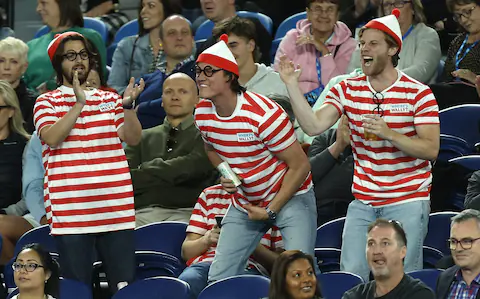One peculiar aspect of the Djokovic phenomenon is the way his dominance tends to be portrayed as cold, clinical and predictable. For has there ever been a man such a magnet for controversy and rage? Yes, he might have won five of his past 10 grand-slam tournaments. But in three of the others, he has been disqualified, deported and banned. Wherever he goes, a flood of righteous indignation rushes in behind.
Djokovic has had to bite his tongue on returning to the scene of last year’s ludicrous circus. He made one revealing remark shortly after landing in Australia, admitting he would “never forget” the five nights he was forced to spend in a detention centre, but has otherwise stayed scrupulously diplomatic. Even in his speech on court, where he ranked this win among his greatest “in the circumstances”, he kept his counsel, describing how he owed his resilience to his humble Serbian origins, with no home-grown heroes to emulate.
In truth, the picture is more complex than this. If Djokovic’s tenacity in becoming a 10-time champion seemed exceptional, even by his standards, it is because the circumstances were exceptional. While he avoided dwelling in public on his ordeal the year before, he recalled it only too keenly, using the memory to summon the harshest answer for his detractors.
It was no coincidence that his most one-sided win came against Australia’s Alex de Minaur, who had been vocal in blaming him over the vaccination saga, laughing in a press conference when informed that Djokovic had been thrown out of the country. Djokovic was left seething by that response, swatting him aside this year for the loss of just five games. “I don’t have any relationship with him,” he told Serbian reporters. “I don’t have any communication with him. He showed in 2022 what he thinks about me.”
Djokovic is never more savage than when rousing himself in reaction to a personal affront. In Australia, he had the perfect fuel, turning a scene of bleak humiliation into one of joy unconfined. It was the ultimate platform for his me-against-the-world mentality. Where Roger Federer won 20 majors being universally adored, Djokovic has won 22 being about as popular as Banquo’s ghost.
His battle against absurd Covid officialdom rumbles on. As it stands, Djokovic is banned from Indian Wells or Miami in March. Given the Biden administration’s continued prohibition of unvaccinated foreigners, he could yet be frozen out of the US Open again.
Still, Djokovic proved with this latest masterclass that he could prevail not just over any opponent, but over any of the sanctimonious critics who once revelled in his misfortune. Only a fool would decry him as the villain now.
Source: The Telegraph


mid convulsive emotion for Novak Djokovic on Rod Laver Arena, it was Nick Kyrgios who cut to the essence of it all. “We created a monster,” he wrote. He did not intend it as a compliment to his fellow Australians. On the contrary, it was a statement on the pious posturing that had led to the Serb’s demonisation 12 months earlier, and the bloody-mindedness he has channelled to deliver one of sport’s most delicious acts of vengeance.
It can be an overused trope, revenge. But nothing else quite captures the narrative flip that Djokovic has engineered in Melbourne. One year ago, he was the pariah of the parish, derided as “Novax Djocovid” for daring to remain unjabbed, a man whose eventual deportation was exploited by the Australian government for cynical political capital. Now he can reflect contentedly on having the last word over all those opportunists who used their five minutes of fame to expose him to global ridicule.
A record-equalling 22nd major title for Djokovic is one in the eye for Karen Andrews, the former home affairs minister, who a few weeks ago was still pompously declaring that the reinstatement of his visa would be a “slap in the face for those people in Australia who did the right thing”.
It is a rebuke to Scott Morrison, the former leader who made him the fall guy for the nation’s tough border policies, all in a futile bid at re-election. And it is the ultimate smackdown of Alex Hawke, the then immigration minister, who spuriously painted his presence in the country as a lightning rod for anti-vaxxers at a time when millions of booster shots were being administered.
Djokovic’s treatment was a disgrace, making him feel, in his words, like the “villain of the world”. No wonder that, after winning his final point against Stefanos Tsitsipas, he lay flat on his back surrounded by his family and coaching team, heaving with sobs. He could find solace in the fact that while the politicians who denounced him would fade into the ether, his own name would, courtesy of this 10th Australian Open triumph, endure for generations.
It is not just the burden of tennis history that Djokovic has had to shoulder this past fortnight. It is the baseless allegations that he has been faking a hamstring injury. It is the equally unsubstantiated claims that his courtside drinks have contained some mystery potion. It is the four Where’s Wally yobs who tormented him from the stands during his second-round victory. It is the disputed translation of what his father Srdjan told a pro-Russian mob after his quarter-final.